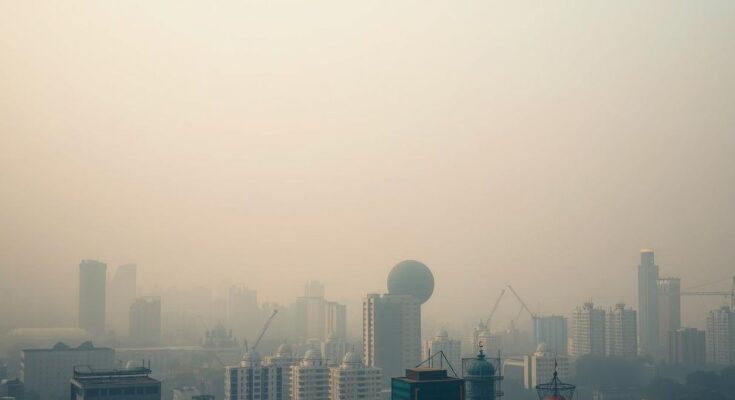In 2024, Bangladesh ranked as the world’s second most polluted country with PM2.5 levels of 78 µg/m³. Dhaka was the third most polluted capital city. Only seven countries met WHO air quality standards. Significant data gaps impede understanding of global air quality. Air pollution is a critical health threat, linked to numerous diseases and high mortality rates.
In 2024, Bangladesh was identified as the second most polluted country globally, with average smog levels exceeding World Health Organization (WHO) guidelines by over 15 times, according to IQAir. The country’s PM2.5 level was recorded at 78 micrograms per cubic meter (µg/m³), surpassed only by Chad, which recorded 128 µg/m³. Following Bangladesh were Pakistan, Democratic Republic of the Congo, and India, with average PM2.5 levels of 73.7 µg/m³, 58.2 µg/m³, and 50.6 µg/m³, respectively.
Dhaka, the capital of Bangladesh, ranked as the third most polluted capital city, with a PM2.5 level of 78 µg/m³. The most polluted capital was New Delhi in India at 91.6 µg/m³, closely followed by Chad’s N’Djamena at 91.8 µg/m³. Kinshasa, the capital of the Democratic Republic of the Congo, ranked fourth at 58.2 µg/m³, while Islamabad, the capital of Pakistan, was fifth with a PM2.5 level of 52.4 µg/m³.
Only seven countries managed to meet the WHO air quality standards in 2024, as per the IQAir data released recently. These countries included Australia, New Zealand, the Bahamas, Barbados, Grenada, Estonia, and Iceland. Researchers cautioned that efforts to combat air pollution would be hampered by the cessation of global air quality monitoring by the United States.
India experienced a reduction of 7% in its average PM2.5 levels, bringing it to 50.6 µg/m³. Despite this improvement, it still housed twelve of the world’s twenty most polluted cities. Byrnihat, an industrial town, was noted as the most polluted city with a PM2.5 level of 128 µg/m³.
The study included data from over 40,000 air quality monitoring stations in 138 regions globally. The WHO recommends a PM2.5 level not exceeding 5 µg/m³, a standard currently met by only 17% of cities worldwide.
Data limitations, particularly in Asia and Africa, hinder a comprehensive understanding of global air quality. Developing nations have previously relied on sensors at U.S. embassies to track pollution but are now without this resource due to the U.S. State Department’s budget cuts, leading to the loss of over 17 years of monitoring data.
Frank Hammes, Global CEO of IQAir, stated, “Air pollution remains a critical threat to both human health and environmental stability, yet vast populations remain unaware of their exposure levels.” He further noted the importance of clean air as a universal human right recognized by the United States.
According to the WHO, 99% of the global populace resides in areas failing to meet recommended air quality levels. Air pollution is a significant global risk factor, leading to substantial mortality rates, particularly among children under five. Exposure to PM2.5 is linked to serious health issues, including respiratory diseases, as well as complications during pregnancy and early childhood, leading to neurodevelopmental disorders and mental health concerns.
In conclusion, air pollution continues to pose a serious threat to public health globally, with Bangladesh marking the second-highest pollution levels in 2024. The persistent health hazards, underscored by significant mortality rates, highlight the urgent need for effective monitoring and intervention strategies. As countries struggle to meet WHO air quality standards, informed public awareness and international cooperation are imperative for mitigating the dire impact of air pollution on health and the environment.
Original Source: asianews.network




